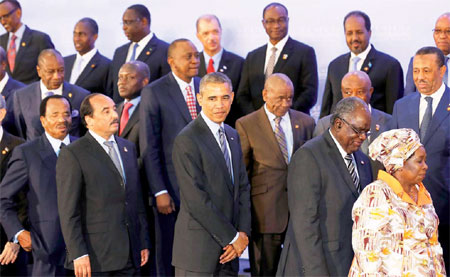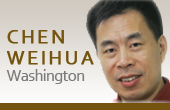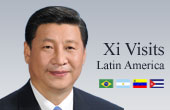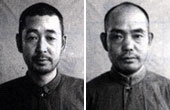US, China can collaborate and compete
By Bob Wekesa (China Daily Africa) Updated: 2014-08-15 09:22
|
US President Barack Obama waits to depart with other leaders after a family photo for the US-Africa Leaders Summit on Aug 6. Larry Downing / Reuters |
As the US-Africa Leaders Summit opened in Washington on Aug 4, expectations for the meeting, which included 50-odd African heads of state and the US President, were sky high. It was, after all, the first ever conference between the US and Africa and thus signaled a momentous shift of US foreign policy.
The fact that most analyses of the summit have looked at how the world's largest and second largest economies play out on the world's least developed continent points to the significance of China-Africa relations.
Despite strenuous denials to the contrary by US officials, analysts from the media, academia and think tanks have framed the summit as the US' strategy to catch up with China in Africa.
Such analyses are not off the mark considering that, under the Forum on China Africa Cooperation, China and Africa have held five consecutive conferences since 2000. Indeed the US-Africa summit had the hallmarks of FOCAC in a manner suggesting the US is borrowing from China: signature projects, especially the Power Africa Initiative, an energy deal; presidential photo-ops; numerous sideline events, notably a business forum presided over by former New York mayor Michael Bloomberg and a US-Africa first ladies' symposium convened by Michelle Obama and former first lady Laura Bush.
If one swapped the main and auxiliary events at the US-Africa summit with FOCAC events you could be excused for imagining being in Beijing in July 2012 when the last FOCAC conference was held.
However, one among many differences is that unlike FOCAC, the US-Africa summit was comparatively short on review of the relations in the recent past. This could be because, under FOCAC, China-Africa relations have ratcheted year-on-year such that the leaders can confidently assess achievements across trade and economics, infrastructure development and peacekeeping, culture and diplomacy.
On the other hand, US influence in Africa, especially in matters economic, has been declining, so much so that there was not much of an upbeat story to tell.
The launch of FOCAC in 2000 coincided with former US president Bill Clinton's inauguration of the African Growth Opportunity Act, that was meant to improve the business environment in Africa. For years, AGOA was seen as the counter to FOCAC, but it has had comparatively limited success and has now been subsumed into the emerging "US rebalance to Africa" strategy.
In focusing on current developments, most analysts seem to have glossed over evidence that the US has been struggling to piece together a cogent response to reclaim its former position in all sectors of Africa for nearly a decade now. A window into US intent to maintain its leadership in Africa by checkmating China can be seen in the US congressional hearings over the past decade.
Probably one of the earliest legislative responses in these respects is US congressional hearings in July 2005, tellingly titled China's Growing Global Influence. During that hearing the US-China Economic and Security Review Commission testified that "there (was) going to be an element of competition between China and the United States in Africa over access to natural resources, winning of commercial tenders, and even African support for occasional different positions on political, economic, and social issues in international forums".
The recommendations of that hearing were that the US should be prepared to compete with China in Africa, but also establish dialogue and "rules of the road" for cooperation. However, it appears that competition won over cooperation.
In June 2008, the US Senate Foreign Relations Committee, then chaired by Joe Biden, now vice- president and the then senator Barack Obama as a member, convened under a more focused headline, "China in Africa: implications for US policy". Russell Feingold, now the US special envoy to Africa's Great Lakes Region, who was then senator for Wisconsin, acknowledged at this hearing the interest generated by the Beijing FOCAC summit of 2006. Indeed, it is the 2006 FOCAC summit that has been mentioned as a cutting-edge event precisely because it was attended by 48 African leaders - a first.
An important consideration offered by US State Department officials was that China's interests in Africa needed to be seen in the context of "China's rise". This perspective was echoed by Dr Elizabeth Economy, who then as now, sits on the influential New York think tank the Council of Foreign Relations.
In 2011, the Senate once more held sessions on China-Africa relations, with panelists including well regarded US China-Africa scholars, David Shinn of George Washington University and Professor Deborah Brautigam of Johns Hopkins University. Shinn's and Brautigam's presentations were much more even keeled, both pointing out myths and exaggerations in the relations while proposing areas of potential collaboration such as in the health and peacekeeping fields.
The one point on which Shinn, Brautigam as well as Stephen Hayes, CEO of the Corporate Council on Africa, concurred was that China had a more elaborate and well resourced diplomatic mechanism in Africa than the US.
It is worth noting that the 2011 Senate panels were held as the current US Secretary of State, John Kerry, was chairman of the Senate Foreign Relations Committee.
A March 2012 congressional discussion seems to have solidified US strategy for re-engagement in Africa given that it was shortly followed by the release of the first ever US-Africa policy in an echo to the China-Africa policy that was published in 2006. Pundits were quick to read an attempt to counter China in the fact that the US-Africa policy was timed to be issued in June 2012, a month before the 2012 FOCAC conference.
The upshot is that the August 4-6 US-Africa summit is the culmination of years of US policy formulation and implementation at the heart of its governance system. The former US president George W. Bush famously said that he did "not view Africa as a zero-sum for China and the United States" during a tour of Africa in 2008, a perspective Barack Obama has enunciated time and again.
However, the fact that Biden, Kerry and Obama sat on the foreign relations committee in a period when themes around implications of China in Africa for the US were being worked out tells a different story.
It would not be far-fetched to conclude the three top US leaders learned deep lessons from China's engagements in Africa during their tenure in the Senate, lessons they are now implementing as wielders of executive power.
The US-Africa summit mirrors FOCAC on many fronts. A lucid example is the symbolism and political capital inherent in taking 50 African leaders to Washington, which strikes a chord with FOCAC events, particularly the 2006 event.
However, the US-Africa summit is not exactly a cut and paste counter to FOCAC. Before the summit, for instance, the Washington think tank the Brookings Institution recommended that the summit come up with a joint communique and action. This counsel seems to have gone unheeded as the event ended more with African leaders listening to Obama than making joint declarations.
Observers have pointed out that failure to demonstrate joint ownership of the event might not sit well with African leaders who are familiar with the FOCAC mechanism that has an inbuilt collective approach.
A second point of note is a protocol issue that was first raised by Stephen Hayes, head of perhaps the most significant US business lobby toward Africa, the Corporate Council on Africa, before the event. In an opinion article, Hayes argued that failure by Obama to have an interactive dialogue with each, or at least a substantial number, of the African leaders would not go down well. This counsel also fell without a ripple in stark contrast to the affability of former Chinese president Hu Jintao shaking hands with African leaders and engaging in personalized discussions during past FOCAC events.
A third example of the points of departure between the US and the Chinese approach is the fact that the US-Africa summit seems to have been crafted as an event rather than a continuing process. By contrast, FOCAC has a number of organizational agencies, key among them the Chinese and African ministerial committee as well as follow-up entities. There are many more differences.
Now that the US seems to have recalibrated its strategy toward Africa, a question worth posing is whether there is room for a trilateral cooperation as scholars, such as Professor Li Anshan of Peking University and former US ambassador to South Africa and Nigeria Princeton Lyman, have proposed. Throughout US congressional deliberations, a common thread has been the possibility of the world's leading economies forging ties with Africa by leveraging their comparative advantages.
As the US strategy toward Africa begins to take shape, just such a proposal appears to be an idea whose time has come. Might the US-China Strategic and Economic Dialogue mechanism be a starting point for reaping the benefits of collaboration, while agreeing that competition is not necessarily a bad thing?
For China Daily
(China Daily Africa Weekly 08/15/2014 page6)











